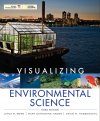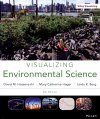Textbook
By: Linda R Berg(Author), Mary Catherine Hager(Author), David M Hassenzahl(Author)
489 pages, colour & b/w photos, colour illustrations, colour tables
![Visualizing Environmental Science Visualizing Environmental Science]()
Click to have a closer look
About this book
Contents
Customer reviews
Biography
Related titles
Recommended titles
About this book
The new third edition provides environmental scientists with an approach that focuses on visuals rather than excessive content. The streamlined coverage discusses the basic science so readers walk away with a strong understanding of the facts. New Think Critically and Data Interpretation features encourage them to analyze visuals and graphs to place information in context. The illustrations have been improved and additional opportunities to conduct real data analysis have been added. The What a Scientist Sees feature also gives environment scientists a real-world perspective of how a concept or phenomenon is applied in the field.
Contents
Foreword
Preface
1. The Environmental Challenges We Face
2. Environmental Sustainability and Human Values
3. Environmental History, Politics, and Economics
4. Risk Analysis and Environmental Health Hazards
5. How Ecosystems Work
6. Ecosystems and Evolution
7. Human Population Change and the Environment
8. Air and Air Pollution
9. Global Atmospheric Changes
10. Freshwater Resources and Water Pollution
11. The Ocean and Fisheries
12. Mineral and Soil Resources
13. Land Resources
14. Agriculture and Food Resources
15. Biological Resources
16. Solid and Hazardous Waste
17. Nonrenewable Energy Resources
18. Renewable Energy Resources
Glossary
Credits
Index
Customer Reviews
Biography
Linda R. Berg is an award-winning teacher and textbook author. She received a B.S. in science education, M.S. in botany, and Ph.D. in plant physiology from the University of Maryland. Her research focused on the evolutionary implications of steroid biosynthetic pathways in various organisms. Dr. Berg taught at the University of Maryland-College Park, for 17 years, and at St. Petersburg Junior College in Florida for 10 years. She has taught introductory courses in environmental science, biology, and botany to thousands of students and has received numerous teaching and service awards. Dr. Berg is also the recipient of many national and regional awards, including the National Science Teachers Association Award for Innovations in College Teaching, the Nation's Capital Area Disabled Student Services Award, and the Washington Academy of Sciences Award in University Science Teaching.
Mary Catherine Hager is a professional science writer and editor specializing in educational materials for life and earth sciences. She received her double-major B.A. in Environmental Science and Biology from the University of Virginia, and her M.S. in Zoology from the University of Georgia. Her Master's research focused on behavioral ecology of schooling fishes. Upon completion of her Master's degree, Ms. Hager worked as an editor for an environmental consulting firm, and as a senior editor for a scientific reference publisher. For the past 15 years, Ms. Hager has worked as a self-employed writer and editor in Lafayette, Louisiana. She has published articles in environmental trade magazines, edited comprehensive federal and state reports addressing wetlands conservation issues, and written componentsof biology and environmental science textbooks for target audiences ranging from middle school to college. Ms. Hager considers her writing and editing pursuits to be a natural product of her scientific training and curiosity coupled with her love of reading and communicating effectively.




































